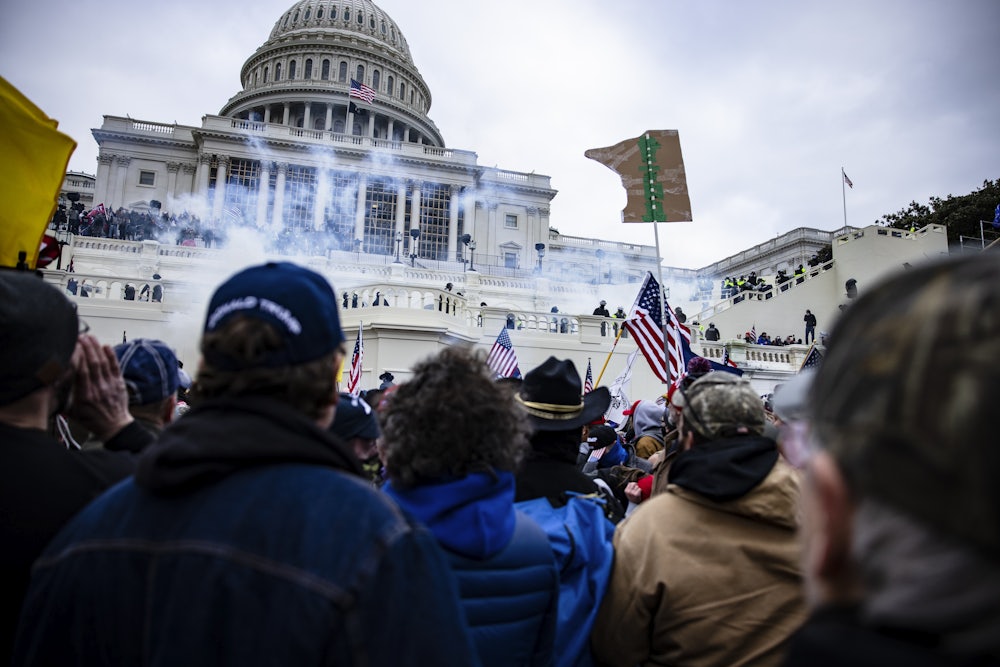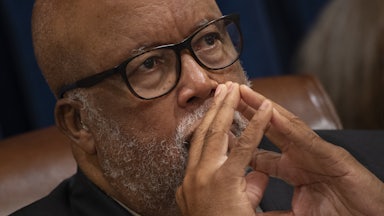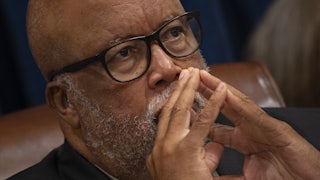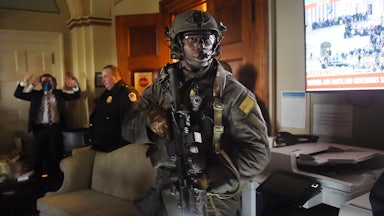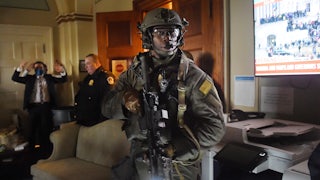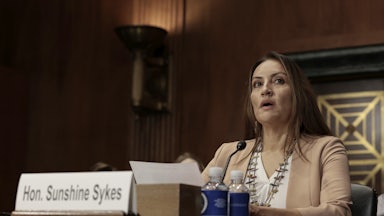Let me start by saying that I don’t know how to write this.
I was evacuated safely from the Senate chamber on January 6, 2021; I was in harm’s way for a few moments at most. That day, there were many others who were more directly in greater danger, such as the law enforcement officers who were violently attacked, who faced verbal and physical abuse, and who suffered emotional and physical trauma with long-lasting repercussions. There were also people at the Capitol that day who had considerably more at stake, such as the lawmakers who were certifying the results of the presidential election.
I’m a journalist, and I don’t like to insert myself into a story. Claiming the center of attention is something that feels so dreadfully egotistical to me. Isn’t it sheer arrogance, to assume that what I have to say is important? To pretend that my experience was anywhere near worthy to share?
In the days and weeks following the riot, I agreed to interviews, believing that—as a witness to history—I had a responsibility to share my account. At the time, I thought it was important to explain that what happened on January 6 wasn’t just a failed insurrection, it was a traumatic experience that affected thousands of people who just happened to be trapped in the Capitol complex at the time.
I wanted people to understand that this wasn’t just an abstract event you watched unfold on your TV: There were human beings inside the Capitol—many of whom were not famous lawmakers—who fought and ran and hid and waited. I wanted to describe the odd mixture of terror and disbelief, the sense that this couldn’t possibly be happening pressing against the knowledge that it was happening and there was nothing I could do.
But I don’t like talking about it. There’s something deeply uncomfortable about discussing something that happened to me rather than a story I ferreted out through reporting. I’ve made myself the story, the one thing a good reporter never wants to do. My personal story is just one sliver of a day, one snapshot out of thousands. It is rooted in emotion, it is not objective, and it is not comprehensive.
There are times I regret dragging my personal experiences out in the open; they’ve now become inextricably linked to my identity. That’s why I still receive interview requests to discuss January 6, which I sometimes accept for the reasons I’ve outlined above. But then there are those times when I might be at a party and the first thing a stranger says to me is, “So you’re the one who was at the Capitol on January 6.” And I want to throw something at their head.
Yet here I am again. There will be plenty of retrospectives on the anniversary of January 6. Reporters better than myself will analyze the minutiae of what happened, forecast what comes next, interpret the echoes rippling through our modern history, eulogize who and what was lost, and, as this piece soon will, share some personal reflections from those who were there. I’m sure that you now have your pick of articles. Thanks for reading this one.
As I have grown incredibly tired of recounting, I was in the Senate chamber when the rioters burst into the building shortly after 2 p.m. that day. At the time, I was working for CBS News, assigned to report on the Senate as it undertook the ostensibly boring process of counting Electoral College votes. (I wrote about this experience in detail for an essay published in Poynter in late January 2021. I invite you to read it, primarily because I am too tired to go through it again.)
We—senators, reporters, and aides alike—were evacuated from the Senate chamber shortly after 2:30 p.m. We ran through the tunnels underneath the Capitol complex like mice scurrying through a maze, following the directions of Capitol Police officers. As we were jogging through the subterranean labyrinth, we passed a couple of confused maintenance workers, bemused by the sight of dozens of senators fleeing through the halls. They did not know what was happening, that their place of work had been invaded, that their lives were in danger just as surely as the lawmakers’ escaping before them.
A few of us told the workers that they needed to get behind a locked door, that they weren’t safe. Senator Ben Ray Luján stopped and stayed to ensure that they found safety. I kept moving, afraid of losing track of where the senators were going; I had been told by a colleague that I needed to stick with the senators, because they were certain to be protected. The rest of us were incidental in that moment, as the priority was—quite understandably—keeping the nation’s representatives, and by extension the institution of democracy, safe from harm.
In a December interview, Luján described to me how he and a few others, including a journalist, told the workers the Capitol was under siege, and that they needed to get to their offices and barricade them.
“That still just doesn’t sit well with me, that there wasn’t a system in place to alert everybody. While I’m grateful as a member of the Senate that the teams were there to keep us safe, everybody should be treated the same as us. People shouldn’t be treated differently because they don’t have the right job title, and that’s something that just really, I’m still not OK with. And that bothers me to this day,” Luján said.
For many people, January 6 was just one day in their lives. It may have been a horrifying one, if they were watching the distressing events unfold on television. But it ended. There was resolution, if not neat, and although the repercussions are still echoing throughout our politics, the day itself is done.
But for many who were present at the Capitol, it’s not over. “By talking about it, it reminds me of the terror of that time, but I also feel a duty to talk about it,” Representative Madeleine Dean told me in a December interview. She was in the House chamber, present as Capitol Police officers barricaded the doors to the room to prevent the insurrectionists from breaking through. She evacuated with the other members and reporters, caught in the mad scramble to escape, and then hunkering down in a colleague’s office for hours.
Dean said that she had spoken to her colleagues about that day, to help them process their experiences. “To a person, that I’ve spoken with, people are thoughtful, recognizing they are still suffering from the trauma of what we went through,” she said. “It’s not something that’s a day and done.”
The law enforcement officers who defended the Capitol on January 6 bore the brunt of that trauma. One Capitol Police officer died after being injured during the insurrection, and four others died by suicide in the months afterward. Around 150 law enforcement officers were injured during the insurrection, including more than 80 Capitol Police officers, and the resulting physical and emotional scars are difficult to move past.
Capitol Police Officer Harry Dunn has been open about his experiences, sharing with reporters and the Select Committee on January 6 how he was subjected to racist invective from the insurrectionists, describing the violence that he witnessed. He told me in a December interview that initially he found it difficult to return to the Capitol, but that working to process his trauma with a therapist had helped him to move forward.
“One of the main reasons why my answer is no, I do not find it difficult, is because I’ve realized what my job is and why I’m here,” Dunn said. “I feel like, looking back at it, it sounds crazy, but I feel honored to be a part of it. And I am responsible for helping protect democracy by protecting the people who the country has elected to represent us. So when I look at the bigger picture—I guess the easiest way to say [it is], the bigger picture is bigger than me. And I got a job to do.”
Dunn said that he has a strong desire for justice, but it’s difficult for him to say what he believes accountability should look like, because “this is unprecedented.”
“You can’t take actions to prevent this from happening again unless you know what actually happened,” he said. “The main thing I start with is finding out what really happened.”
Dunn said that he is hopeful the House select committee on January 6 will uncover the facts necessary to understand the events of the day. Dunn advocated for the creation of an independent commission, which was blocked by Senate Republicans, and testified before the select committee in its first open hearing. In his July testimony, he described being bombarded by a “torrent of racial epithets” during the riot.
“When people say it shouldn’t be political, it was, and it is. There’s no getting around it,” Dunn told the committee in July, describing Trump as the “hit man” who sent the rioters. “What I ask from you all is to get to the bottom of what happened.”
January 6 has not left a scar. Scars only form when wounds heal, when the flesh is knit back together, leaving a mark to remember the violence done against the body, but the violence itself is past.
Scars cannot form when the wound is continuously ripped back open and etched deeper into the skin. January 6 has not left a scar because we are nowhere close to healing. We cannot heal as long as there are two irreconcilable versions of reality warring for control of the nation’s psyche: one where a failed insurrection shook the very foundations of our democracy, rattling the fragile institution like a child carelessly mishandling an intricately designed but delicate toy; and one where you’re crazy, that violence didn’t occur, but if it did it was completely justified, and actually the real coup attempt happened when Joe Biden dared try to unseat Donald Trump from the presidency.
As long as that second narrative retains its power, and is amplified by members of the very body that was grievously threatened on January 6 and by the former president, in whose name the insurrection occurred, the wound will remain open, and it will fester.
Relationships are different in the Senate. When you watch the Senate floor during votes, as I have done many, many times, you witness how much senators genuinely seem to like each other. They chat on the floor, often bridging the unofficial divide between the Republican and Democratic sides of the chamber to say hello to their colleagues on the other side of the aisle.
Democratic Senator Chris Murphy told me in December that he was “despondent at the turn much of the Republican Party has taken since January 6.” But that did not necessarily preclude bipartisan cooperation. “The Senate is a small place; we have to find ways to get along,” Murphy said. “There are far fewer Republican senators than House members that have taken the side of the rioters.” (This is not to say that all relationships are fine and dandy in the Senate, or that Democrats pull their punches in criticizing Republicans and vice versa; perhaps compartmentalization is simply easier in a smaller chamber.)
The House is different. While only seven Republican senators voted against certifying the Electoral College results, mere hours after an insurrection attempting to overturn the election threatened their lives, more than 100 Republican representatives voted to do so. With that action, already tense relationships within the House turned toxic. As with a fractured bone that has gone unset, the body has limped forward, but each step is ragged and halting, doing further damage to the untreated injury.
Dean said that the events of January 6 had helped to strengthen some relationships and put an “extraordinary strain” on others. There is “a bond that cannot be broken” between the colleagues with whom she sheltered on the day of the insurrection, and between the impeachment managers. But, she said, she has a “hard time understanding lack of seriousness from some of the Republican legislators” who insist on whitewashing the events of the day.
“That is so not credible, so not deserving of someone who has sworn an oath to protect our democracy,” Dean said.
It would be wrong to insinuate that Republicans as a bloc were unaffected by the events of January 6. Senator Mitt Romney told NBC News in April that he hoped the Capitol never felt “normal” again for those who had lived through the riot. “I hope that I and others who come here will remember that when we succumb to untruths as a nation, that it can lead to violence and even death, as it did,” Romney said.
Ten Republican representatives voted to convict Trump on January 13, one week after the attack, and seven GOP senators voted to convict him. Thirty-five Republican representatives voted to create a bipartisan, independent commission investigating the origins of the attack, and six GOP senators voted to do so, as well.
“Truth is hard stuff, but we’ve got a responsibility to it,” Senator Lisa Murkowski said before the Senate vote on the commission. “We just can’t pretend that nothing bad happened, or that people just got too excitable. Something bad happened. And it’s important to lay that out.”
Two Republican representatives, Liz Cheney and Adam Kinzinger, serve on the House select committee on January 6, although they have largely been ostracized by their own party.
Even voting against certifying the election results is not necessarily a sign that a Republican member supported the goal of the insurrection. Representative Peter Meijer told The Atlantic that a Republican colleague had told him he would vote against certifying the election results because he was afraid for his family.
“Remember, this wasn’t a hypothetical. You were casting that vote after seeing with your own two eyes what some of these people are capable of,” Meijer said. “If they’re willing to come after you inside the U.S. Capitol, what will they do when you’re at home with your kids?”
Representative Tom Rice, one of the 10 Republicans who voted to impeach the president, told Politico in December that he regretted his vote against certifying the Electoral College results.
“In the wee hours of that disgraceful night, while waiting for the Capitol of our great country to be secured, I knew I should vote to certify. But because I had made a public announcement of my intent to object, I did not want to go back on my word. So yeah, I regret my vote to object,” Rice said.
But this is a rare example of remorse. The majority of Republicans voted against impeachment and conviction, against the creation of a commission, against the creation of the select committee, and against holding Steve Bannon and Mark Meadows in contempt of Congress for refusing to comply with congressional subpoenas. Cheney was removed from her leadership position because of her repeated criticism of Trump and refusal to downplay the events of January 6. Several Republican members of Congress maintain that detained rioters are political prisoners, and many of the people present at the rally before the insurrection are now running for political office. Trump himself maintains that the election was stolen, and polling shows that many Republicans in the country agree with him.
But this is not a piece about the future, or what comes next. When I was describing this assignment in the weeks leading up to writing it, I often joked that it could be summarized in two sentences, a bleak upgrade to Hemingway’s famous six-word short story: How are people feeling? Not great.
But gauging the vibe, so to speak, necessarily must look forward. Trauma is not just reactive but can also be proactive, filled with portents and mined with dread. “This did happen, this will happen again, and I can’t stop it.”
The insurrection on January 6 didn’t work. But what if it had? No lawmaker was harmed. What if the violence had been more severe? This line of thinking prompts other questions: Can we expect another, similar attempt after future elections? What if the next effort to overturn the election occurs through means masquerading as legitimate? There are laws under consideration in Republican-controlled states that Biden narrowly won that would make it easier for legislatures to overturn the results of an election, raising the possibility that the will of the people will be overturned by their own representatives, who themselves may have been elected into districts gerrymandered to solidify the power of one party. (In a sign of how most Republicans view this possibility, Senate Minority Leader Mitch McConnell said Tuesday that the idea that state legislatures would overturn election results is “ridiculous on its face.”)
Democrats in the Senate are now arguing that the anniversary demonstrates the necessity of passing voting rights legislation to counteract these state laws, and are considering changing Senate rules to allow such bills to avoid a Republican filibuster. Republicans argue that Democrats are trying to implode Senate precedent to pass partisan voting legislation. (The bills under consideration and passing in state legislatures are strictly partisan, written and approved by Republicans.) Democrats are concerned that the next efforts to overturn the election could occur through ostensibly legitimate means.
“It feels less like we’re still living in the shadow of January 6, and more like we are living in the prologue to whatever it is that January 6 was the beginning of,” one House Democratic aide who was at the Capitol on January 6 told me. “January 6, to me, was the canary in the coal mine kind of event.”
Luján said that he was concerned by the continued “hate and inflamed rhetoric” from Trump and his supporters.
“We are all here to represent people all across America. We have different approaches to getting to solutions. But we should be able to embrace civility, and be able to talk to one another, and trust that no one’s going to harm you here. A lot of that has been lost,” Luján said. “And it concerns me for the health of the legislative branch of government, for the health and safety of everyone who has volunteered and sacrificed to be here to make our democracy work.”
There was a flickering, all-too-brief moment on January 6 when it appeared that Republicans and Democrats might come together in the wake of a horrific attack that threatened the very foundations of democracy, a shining glimpse of bipartisan camaraderie in the wake of tragedy that signaled what might have been. When Vice President Mike Pence reentered the Senate chamber after it had been cleared of rioters, he received a standing ovation from Democrats and Republicans alike, exhausted yet determined to continue their civic duty.
But it was a shimmering soap bubble, easily popped; the Electoral College count continued with its objectors in tow, unbowed by the attack that had sought to overturn the election. The mood in the Senate was tense as certain senators objected to the results and downright hostile in the House—the closest I have ever seen members come to blows was in the wee hours of the morning of January 7 in the House chamber.
The lack of agreement in Congress as to how to move forward in the wake of the attack raises the question of how, exactly, we are supposed to mark this wretched anniversary. If some want to remember, some want to forget, and some want to distort the truth beyond recognition, how can we express our collective grief?
Ultimately, Luján argued, the future is down to all of us. “Every one of us has a responsibility to make it better. Every one of us, including myself, we all have to do better,” Luján said.
